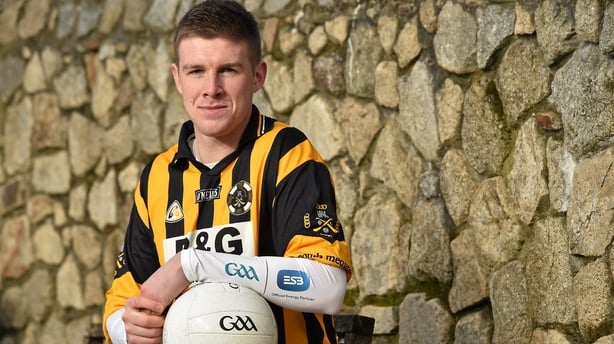Shane Carthy was born and raised in the picturesque north Co Dublin seaside town of Portmarnock.
The baby of the house was sports mad from a young age. He was a strong hurler, soccer player and swimmer, and had three older sisters who acted as a constant source of protection and support.
Carthy was a contented child and, as the years passed, developed into a teenager who seemed certain to be going places.
He was on the Dublin minor football team, the pride of his club Naomh Mearnóg, and destined to fulfil his ultimate dream of representing the Sky Blues at senior level.
He'd been inspired by trips to Croke Park with his dad to watch Shane Ryan, another Portmarnock man who shone with the Dubs.
By the time he was 18, Carthy had achieved that goal. He was part of the 2013 panel that beat Mayo to lift the Sam Maguire.
Everything in his life seemed perfect, but, as Carthy told RTÉ Radio 1's The Ryan Tubridy Show: "From within, there was a very, very different story going on."
Halfway through his fifth year in secondary school, he began to feel differently.
"It was a gradual process," he said. "I was so uneducated that I thought it was hormonal changes going on in my body from the outset.
"It was only a year and a half into [suffering from depression] that alarm bells started ringing, and I was thinking, 'I need to speak up here'.

"It was getting so much worse that a week after the All-Ireland final was the first time I thought about suicide.
"It was something I couldn't make sense of. That was the frustration. I was living this idyllic life from the outside looking in. I was 18 years of age, representing the Dublin senior footballers.
"I didn't want any part of the world. That's the internal dialogue I was having.
"I was thinking, 'I'm this man living this idyllic life at such a tender age, I'd got my hands on my first All-Ireland a week previous, and yet a week later I don't want any part of this world'.
"It was a scary, scary process because as I said, I couldn't make sense of what was going on in my head. The cloudiness was at an all-time high.
"I'd shut up shop for the last year and a half, putting up that poker face, putting up that mask. No one knew what was going on in my world.
"That was the first time I thought, 'I need to speak up here', but I didn't know what I wanted to say."
Initially Carthy shied away from his problems. He threw himself into Dublin training, hoping the natural endorphins physical activity promotes would be enough to lift his mood.
"That was my crutch," he says. "I was essentially running away from the thoughts that were within [me]."
The turning point came when his maternal grandparents passed away within six weeks of each other. He was 19, and was badly struggling.
"It was a constant spiral and I couldn't make sense of it."
Carthy would go to work with bloodshot eyes having spent hours crying, often telling colleagues he was going to get a coffee before driving to the beach or train station to cry some more.
As the cracks began to widen, he simply couldn't hide it anymore.
"It was a constant spiral and I couldn't make sense of it."
On the day of the 2014 All-Ireland Under-21 final, his mother found him crying in the sitting room. It was the first time she'd seen her son shedding tears.
A simple act of sympathy - she put her arm around his shoulder and offered some words of comfort - was enough for the floodgates to open.
Finally, Carthy was able to talk about his pain. He went for a long walk around Howth Head with his sister Mairead, and then he travelled to Portlaoise to play for Dessie Farrell's team in the decider against Meath.
"To this day," he says, "it was the most satisfying 60 minutes of football I've ever played in my life. I remember with a couple of minutes to go looking at the ref and thinking, 'don't blow that whistle. I don't want to leave this pitch - I'm in heaven here'.
Dublin won by five points, and Carthy was named the man of the match.
'I didn't want to be part of this world’ - All-Ireland winner @S_Carthy8 spoke on the @RyanTubridyShow about his on-field success with @DubGAAOfficial at a time when he considered taking his own life pic.twitter.com/IAi58AFdbF
— RTÉ GAA (@RTEgaa) August 18, 2020
Afterwards he shared his struggles with Farrell, who had worked as a psychiatric nurse and had previously been open about his own battle with depression.
Farrell organised a meeting with a psychologist but Carthy didn't get the chance to have that meeting. The next day after his dad collected him from training, he had a massive panic attack, blacking out in the car and waking up in St Patrick's Hospital.
"Two female nurses were at my bedside and they explained exactly what had happened. Once I heard the term, 'mental hospital', my world turned upside down. I thought, 'I need to get out of here'. I thought I was going to run into people in straight jackets. It was anything but.
"I spent 11 weeks in total in St Pat's. I came out publicly with my story. And that was the point a massive, massive weight came off my shoulders.
"I always said I'd love to share my story, whether it be months or years when I get out of here and my life is back on track. That's what I did."

Carthy took on board as much information and guidance as he possibly could to help him on the road to recovery. Slowly, he learned how to manage his illness.
"I still have my good and bad days, I'll never shy away from that fact, but because of the education and knowing what works for me and what doesn't, I have all these tools and resources. I always refer to it as my mental health toolbox that I can dip in and out of it."
And the most important tool?
"It's still physical exercise. It's very individualistic. I'd say to people, 'what works for me may not work for you - but the thing is, find out what works for you'."
We need your consent to load this rte-player contentWe use rte-player to manage extra content that can set cookies on your device and collect data about your activity. Please review their details and accept them to load the content.Manage Preferences

